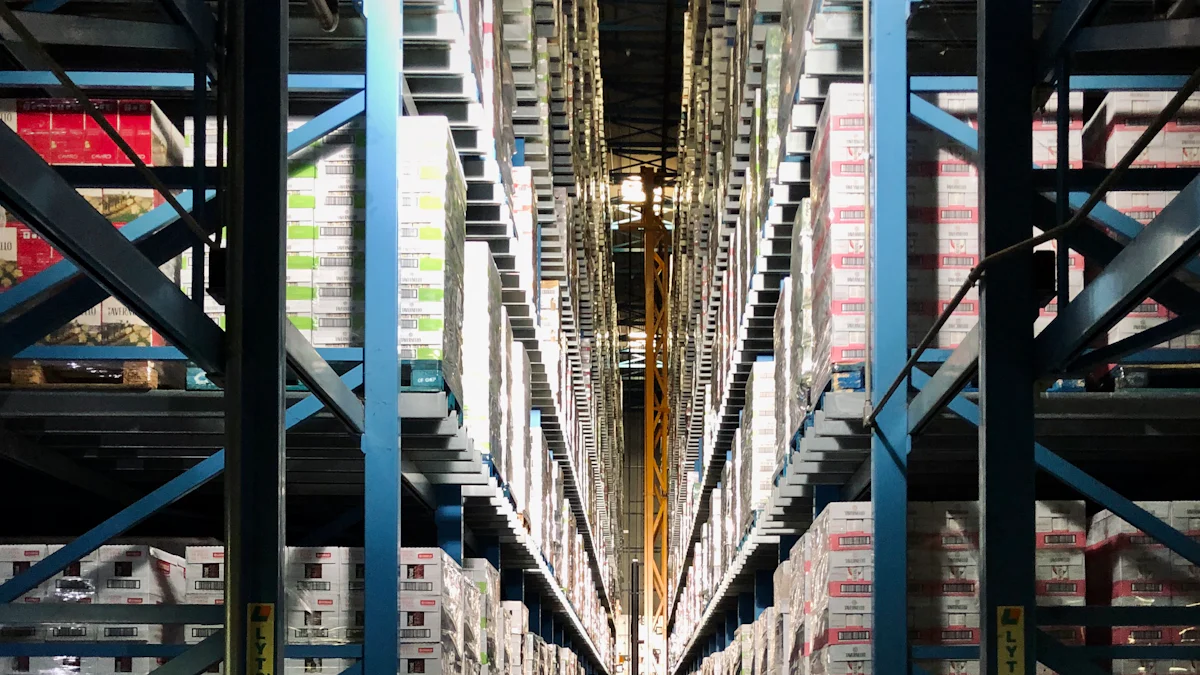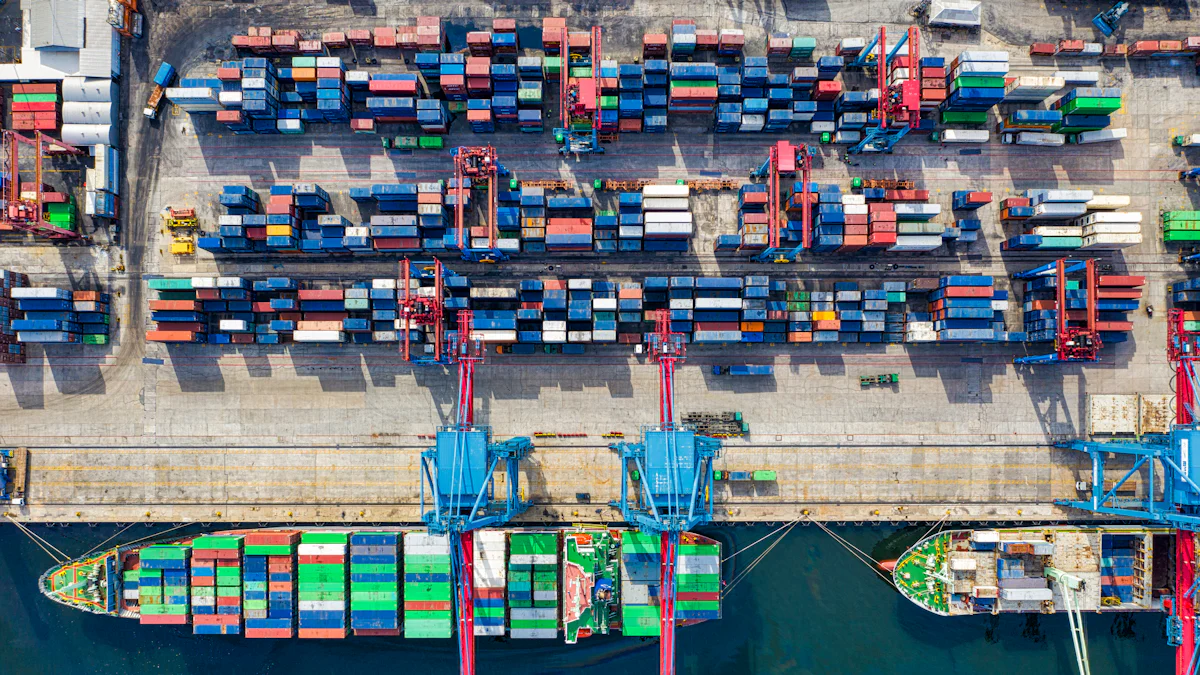Emerging Supply Chain Innovations for 2024

Supply chain innovations play a pivotal role in shaping the future landscape of operations. With rapid technological advancements driving change, it's crucial to stay ahead of the curve. In 2024, key innovations are set to revolutionize the industry, impacting processes and efficiency. This blog delves into these advancements, exploring their potential implications and how they can redefine supply chain management.
Technological Advancements in Supply Chain Management

Artificial Intelligence and Machine Learning are at the forefront of transforming supply chain operations. The integration of Predictive Analytics enables companies to forecast demand accurately, optimize inventory levels, and enhance decision-making processes. According to a study by McKinsey & Company, AI-equipped supply chains are over 67% more effective with reduced risk and lower overall costs.
The shift towards Autonomous Decision-Making is revolutionizing how businesses manage their supply chain strategies. By leveraging AI algorithms, organizations can streamline operations, reduce human errors, and improve overall efficiency. Research suggests that autonomous supply chain planning could increase revenue by up to 4 percent and decrease costs by up to 10 percent.
Embracing Generative AI in Operations opens new horizons for innovative practices within the supply chain realm. This technology empowers systems to create data-driven solutions independently, fostering agility and adaptability in dynamic environments. KPMG professionals highlight that advanced technologies like generative AI are reshaping the core of supply chain management.
Internet of Things (IoT)
The expansion of the Internet of Things (IoT) is redefining how companies track assets and monitor processes in real-time. Through Real-Time Tracking, businesses gain visibility into their entire supply chain, enabling proactive decision-making and enhancing customer service. Global adoption of IoT solutions in supply chain management is projected to significantly increase as companies seek greater operational efficiency.
Incorporating IoT devices into Smart Warehousing practices optimizes storage facilities and inventory management processes. These interconnected systems enhance productivity, minimize errors, and improve order fulfillment accuracy. Companies can leverage IoT technology beyond warehouses to enhance Yard Management, preventing loss of goods during transit while ensuring timely deliveries.
Blockchain Technology
Blockchain Technology offers unparalleled opportunities for enhancing transparency and security within the supply chain ecosystem. The implementation of this decentralized ledger system ensures Enhanced Transparency across all transactions, reducing fraud risks and promoting trust among stakeholders. Companies can leverage blockchain for secure transactions, creating a tamper-proof record of every interaction along the value chain.
The concept of Digital Supply Chain Twins revolutionizes traditional supply chain models by creating digital replicas that mirror physical operations in real-time. This innovation enables companies to simulate scenarios, optimize processes, and identify potential bottlenecks proactively. As highlighted by industry reports, blockchain technology plays a pivotal role in driving better processes within supply chain management practices.
Sustainable Supply Chain Practices

Green Logistics
Eco-Friendly Transportation
Implementing eco-friendly transportation methods is essential for reducing carbon emissions and promoting sustainability in the supply chain. Companies like Patagonia have successfully integrated electric vehicles and biofuel-powered trucks into their fleets, significantly reducing their environmental impact.
By adopting electric vehicles and optimizing delivery routes, companies can minimize their reliance on fossil fuels and decrease air pollution levels. This shift towards sustainable transportation not only benefits the environment but also enhances operational efficiency and reduces long-term costs.
Carbon Footprint Reduction
Reducing the carbon footprint of supply chain operations is a top priority for organizations committed to sustainability. A recent consumer sentiment study revealed a growing interest in environmentally friendly delivery methods, highlighting the importance of eco-conscious practices.
Leveraging AI-equipped supply chains can significantly contribute to carbon footprint reduction by optimizing transportation routes, minimizing fuel consumption, and enhancing overall efficiency. Companies are increasingly investing in green logistics initiatives to align with consumer preferences and boost their brand image.
Circular Economy
Waste Minimization
Embracing a circular economy approach involves minimizing waste generation throughout the supply chain lifecycle. By implementing recycling programs, reusing packaging materials, and reducing excess inventory levels, companies can effectively minimize waste production.
The impact of sustainability and environmental issues on supply chains has prompted organizations to scramble in creating actionable plans for achieving net-zero promises. Through waste minimization strategies, companies can reduce landfill contributions, conserve resources, and drive sustainable practices across the value chain.
Resource Efficiency
Enhancing resource efficiency within supply chain operations is crucial for long-term sustainability goals. By optimizing energy consumption, water usage, and material sourcing processes, companies can improve resource utilization efficiency while reducing operational costs.
Companies are increasingly focusing on sustainable procurement practices to ensure compliance with sustainability laws and regulations. Integrating resource-efficient technologies and processes not only drives cost savings but also fosters a culture of environmental responsibility within the organization.
Compliance with Sustainability Laws
Adhering to sustainability laws is paramount for organizations aiming to establish ethical and environmentally conscious supply chains. By complying with regulations related to waste management, emissions control, and renewable energy usage, companies demonstrate their commitment to sustainable practices.
The integration of sustainable supply chain practices not only ensures legal compliance but also enhances brand reputation and attracts environmentally conscious consumers. As businesses navigate the evolving landscape of environmental regulations, prioritizing compliance becomes a strategic imperative.
Human-Centric Innovations
In the realm of supply chain management, embracing Workforce Automation is a strategic move towards operational excellence. The integration of Robotics in Warehousing streamlines tasks, enhances precision, and boosts productivity on the warehouse floor. By automating repetitive processes, companies can optimize workflow efficiency and minimize errors.
Implementing Automated Quality Control mechanisms ensures consistent product quality and compliance with industry standards. These automated systems conduct thorough inspections, detect defects promptly, and facilitate timely corrective actions. Leveraging AI-driven quality control solutions enables organizations to uphold rigorous quality assurance protocols throughout the supply chain.
The advent of AI-Enabled No Touch/Low Touch Planning revolutionizes planning processes by leveraging artificial intelligence algorithms for optimized decision-making. These advanced planning systems analyze data trends, forecast demand accurately, and recommend efficient strategies for inventory management. By integrating AI-enabled planning tools, companies can achieve agility in adapting to market fluctuations while ensuring seamless operations.
Employee Well-being
Prioritizing employee well-being is paramount for fostering a positive work environment within the supply chain industry. Implementing Ergonomic Solutions in workplaces minimizes physical strain, reduces injuries, and enhances overall comfort for employees. Ergonomically designed workstations and equipment promote productivity while mitigating health risks associated with prolonged manual labor.
Initiating comprehensive Mental Health Initiatives underscores the importance of psychological well-being among employees in high-pressure environments. Providing access to mental health resources, counseling services, and stress management programs cultivates a supportive workplace culture that values mental wellness. Companies that invest in mental health initiatives witness improved employee morale, reduced absenteeism rates, and enhanced overall performance.
Addressing the challenge of skilled labor shortages requires proactive Skilled Labor Shortage Actions to build resilience within the workforce. Offering upskilling opportunities, training programs, and career development pathways empowers employees to acquire new competencies and adapt to evolving job roles effectively. By nurturing talent internally and attracting skilled professionals externally, organizations can bridge skill gaps and fortify their competitive edge in the dynamic supply chain landscape.
Innovations in supply chain management drive efficiency, cost-effectiveness, and customer satisfaction. Embracing advanced strategies and operational excellence leads to improved competitiveness and market positioning. Companies focusing on agility and resilience navigate complexities effectively, turning challenges into growth opportunities. A digital supply chain mindset inspires continuous innovation, experimentation, and adaptation to evolving market demands.
See Also
Enhancing Productivity: AI Innovations in Supply Chain
Transforming Transportation: Supply Chain Innovation Effects
Discovering 5 Advanced Supply Chain Efficiency Methods
Artificial Intelligence in Supply Chain: Logistics Transformation Ahead
